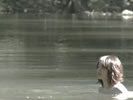Eye For Film >> Movies >> Nymph (2009) Film Review
The camera drifts fluidly through the canopy of a jungle, down to the ground, casually taking in the passage of a distressed woman in flight and her two shirtless male pursuers. It then reverses its direction and circles round a tree to the sandy bank of a creek, where it rises again into the canopy. Moving through the air over the water to the treetops opposite before twisting back round to an aerial of the stream below - in which the bodies of the two would-be rapists are floating - the camera descends again and heads on to some felled trees along the riverside.
Opening shots rarely come more bravura than this. Lasting several minutes, this single, uncut take seems – well-nigh impossibly – to combine handheld, dollying and crane work, while capturing, askance and as if by accident, an event whose details remain shrouded in mystery (what happened to the girl? how did the men die?). What is more, despite the camera's weirdly angular shifts in direction and unnatural leaps from forest floor to crowning foliage and back again, the occasional sound of female breathing that intrudes upon all the creaks and birdsong of the jungle leaves it clear that what we are watching, in all its puzzling paradoxicality, represents the point of view of an unseen - and apparently supernatural - figure amid the trees.

Indeed, this uncanny opening might give viewers the impression that Nymph is a horror film – an impression that is only reinforced by the subsequent introduction of male protagonist Nop (Jayanama Nopachai) using an old-fashioned camera to take photos of a rural man talking about ghosts ("there are good spirits and bad spirits"). That Nop is then shown developing his own film in a private dark room would seem to be the genre clincher – this is to be Shutter (2004) all over again, right down to the photographic theme and the Thai setting.
Except that it isn't. For while what follows in this seventh feature from Pen-Ek Ratanaruang (6ixtynin9, Last Life In The Universe, Invisible Waves) is certainly eerie and enigmatic, the real focus here is, as in his previous film Ploy (2007), the rot that has taken root in an urban marriage. The sap has long since stopped flowing in the relationship between Nop and his wife May (Wanida Termtanaporn), and for some time she has been having an affair with her boss Korn (Chamanum Wanwinwatsara). Yet when the couple goes on a camping trip to the jungle and Nop vanishes shortly after photographing (and embracing) an ancient tree, May finds herself no less lost in her residual feelings for her husband than in the jungle - before at last she confronts the primal force that has seduced him away from her.
In Nymph, as in Vinyan (2008), we are being taken through a heady, atavistic landscape that belongs as much to the mind and the heart as to the conventional spaces of topography – although here, the manic grief and anger that drove Fabrice Du Welz's film have been replaced with the quieter, but equally destructive, powers of time, nature and decay.
Boasting beautiful photography and stunning sound design (where forest ambience blends seamlessly with Koichi Shimizu's electro-percussive score), Nymph is ultimately like the lengthy opening shot – deliberately paced, oblique and somewhat meandering, but artful precisely for showing only what it shows, and leaving the viewer to puzzle out afterwards the significance of what they have seen, and of what might have gone on in the shadowy ellipses that have remained off-screen.
Reviewed on: 02 Nov 2009

















